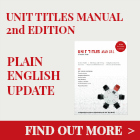When common sense is in short supply
 John Green, professional arbitrator, adjudicator and mediator discusses what is likely to go sideways between bodies corporate and owners
John Green, professional arbitrator, adjudicator and mediator discusses what is likely to go sideways between bodies corporate and owners
Common sense is supposed to be, like its name suggests, common. The implication is that everybody has a quota of similar sensible thinking influencing their decision making and behavior, and if used, the result will be perceived and accepted as “sensible” by everyone involved.
But what happens when common sense is a rarity? When it’s an endangered attribute that very few share?
It’s when a common sense view of what is sensible is NOT shared that John Green is asked to get involved.
The challenges of apartment block living
As more and more of us move into apartments we find ourselves (surprise, surprise – gasp!) having to live more closely to our neighbours than we’ve ever been used to.
Top of the complaint list are misunderstandings about what constitutes disruptive and unreasonable noise, debates about car parks (availability and use), disagreements about taste and discussions over pets.
 According to John, the ensuing challenges are not unique. They are the same regardless of whether the apartment block is in Wellington, Auckland or Christchurch. Top of the complaint list are misunderstandings about what constitutes disruptive and unreasonable noise, debates about car parks (availability and use), disagreements about taste and discussions over pets.
According to John, the ensuing challenges are not unique. They are the same regardless of whether the apartment block is in Wellington, Auckland or Christchurch. Top of the complaint list are misunderstandings about what constitutes disruptive and unreasonable noise, debates about car parks (availability and use), disagreements about taste and discussions over pets.
At least part of the struggle people have adapting to close quarter living is down to its newness. New Zealand does not have a history of apartment dwelling. We’ve been a quarter acre pavlova paradise, at least in mythology, if not in fact, for a long, long time. Each person, or family, had their own house, on their own piece of dirt. That dirt was his country. That home was his castle and he could do whatever he liked within its walls. In and on his own place he was king – answerable to no one. He could paint the exterior walls lolly-pink. He could play the worst songs ever loud at 3 o’clock in the morning, and decide to fire up the electric drill he got for Father’s Day – just when you put the baby down for a mid-morning nap.
Disturbing the peace is rare
John says most of the time we co-exist fairly well and are perfectly reasonable as long as we get to do what we want, when we want. The reality is that deliberate, provocative rule breaking is relatively rare. More often than not, the person causing the disruption is blissfully unaware that they are doing so.
To live together harmoniously, he says, we must learn to play nicely, which means considering others.
All bodies corporate have rules to regulate the running of apartment blocks and to ensure, as well as protect, the quality of life of all of its members.
How to play nicely
In John’s opinion, playing nicely is best achieved in two ways:
- Property managers need to deal with matters as they arise promptly, efficiently and empathetically.
- Owners need to understand exactly what they have let themselves in for when buying into a complex.
Will you take this body corporate to be your lawful wedded …?
In John’s opinion, compliance with body corporate requirements is similar to a marriage. Inevitably there will be “for better or worse” aspects to the relationship and the only way to avoid potentially nasty surprises, is investigate thoroughly prior to getting involved.
However, once the decision has been made to buy, the owner needs to accept full responsibility for his side of relationship. That means reading all the body corporate material as it is issued to keep up on business, exercising the right to vote, and perhaps serving on the committee.
Forestalling financial woes
The most difficult matters to deal with, he says, are often financial, and a dispute can easily arise because an owner has not understood or is not able to meet the fees.
It is imperative for prospective owners to review the financial records and/or to have a professionally qualified person go through them on their behalf. A search will reveal any issues the body corporate is facing. The types of questions to ask are:
- Is there a history of disputes? Have they been solved?
- Is there a long term maintenance fund?
- Are the levies reasonable? (Insufficient funds to meet immediate as well as future maintenance needs can escalate into a very difficult problem very quickly.)
- Are any one off projects planned? If so, how are they going to be financed?
Ignorance is neither a defense nor a protection. John says one of the most painful circumstances is for an owner to have their property sold in order to pay what is owed. Due diligence done at the right time would likely prevent that situation from arising.
Dealing with differences
In all instances whether it be loudness, littering, visual pollutants (washing on the balcony, painting the wall pink …), pets who poop in inappropriate places, car park disagreements, security issues, or financial concerns, talk to the property manager first.
If the matter cannot be resolved ‘in house’ - between the owner and the body corporate the next step could be to take advice.
Mediation
A 3rd party mediated intervention between the parties concerned can remove any heat from the situation, giving both sides of a dispute an equal hearing. A mediator will not make a decision; rather they will facilitate a discussion leading toward reaching a mutually acceptable and binding agreement. A mediated agreement is less formal that going to court.
Tenancy Services
 Tenancy Services is a part of the Ministry of Business, Innovation and Employment.
Tenancy Services is a part of the Ministry of Business, Innovation and Employment.
The Ministry’s aim is to help people avoid and resolve disputes without needing to apply to the Tenancy Tribunal. However, if you do apply, the Tenancy Tribunal hears and resolves of the majority of unit titles disputes, up to a value of $50,000.
The District Court hears disputes relating to the application of insurance money up to $50,000 and other disputes of a value between $50,000 and $200,000
The High Court hears disputes relating to the title to land, disputes relating to the application of insurance money in excess of $50,000 and other disputes in excess of $200,000.
The Unit Titles section of the Tenancy Services website provides information on:
- The Unit Titles Act
- Governance
- Operational rules
- Body corporate meetings
- Maintenance
- Financial management
- Renting, leasing and buying a unit
- Disputes
About John Green
 John is a professional arbitrator, adjudicator and mediator based in Auckland, New Zealand and is the Managing Director of New Zealand Dispute Resolution Centre (NZDRC). John contributed a chapter on dispute resolution to the recently published Second Edition of The Unit Titles Manual.
John is a professional arbitrator, adjudicator and mediator based in Auckland, New Zealand and is the Managing Director of New Zealand Dispute Resolution Centre (NZDRC). John contributed a chapter on dispute resolution to the recently published Second Edition of The Unit Titles Manual.
NZDRC is a private dispute resolution service established to give parties to civil and commercial disputes the widest capacity to adopt dispute resolution processes that are private, fair, prompt and cost effective, and which will provide a proportionate response to the amounts at issue and the complexity of the issues involved.
NZDRC provides a full suite of private conflict management and dispute resolution services, including conciliation, facilitation, mediation, adjudication, expert determination, early neutral evaluation, and arbitration and regularly provides dispute resolution services to bodies corporate and other parties to unit title property related disputes.
Find out more about John and the NZDRC: New Zealand Dispute Resolution Centre
About the Unit Titles Manual
 The manual has been written expressly to assist bodies corporate and their advisers with the Unit Titles Act 2010 and its subsequent amendments. This recently released second edition has been updated and expanded. To find out more, and to download a sample pdf, please click the link - Unit Titles Manual 2nd Edition
The manual has been written expressly to assist bodies corporate and their advisers with the Unit Titles Act 2010 and its subsequent amendments. This recently released second edition has been updated and expanded. To find out more, and to download a sample pdf, please click the link - Unit Titles Manual 2nd Edition